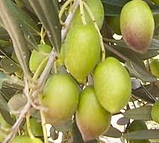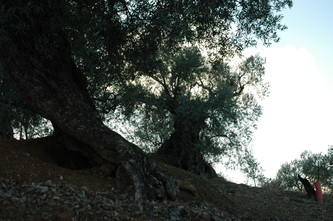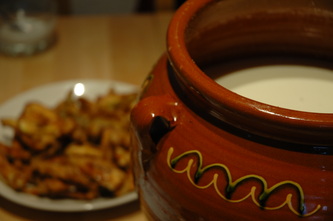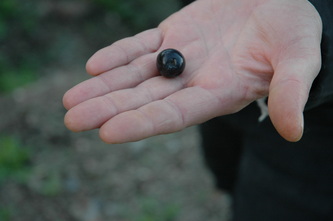OLIVE OIL in La Axarquía, Málaga - Course: OLIVE OIL production, tradition, food
Now during the summer months the olive oil cooperatives in Los Romanes and Periana are closed for production, open only for sales as long as supply lasts. The olive trees are full of small green jewels ripening in the summer sun. Before the harvest in November, work will begin clearing the ground under the trees, so that olives which fall to the ground can be picked up before netting is placed underneath to catch the olives which fall when branches are hit with sticks or vibrated mechanically. These fresh olives are taken to the cooperative within 24 hrs to be pressed to produce Extra Virgen Olive Oil.
Cútar is in La Axarquía, the fertile costal valley just east of Malaga. Olive oil is said to have been produced here since the time when Phoencians brought olive trees here from the Eastern Mediterranean some 3000 years ago. In the ancient world the olive tree was the source of life. It served to adorn the food of humanity, to alleviate its injuries, to give force to their bodies and light their nights.
However, it was the Romans who definitely filled the Iberian Peninsula with olive trees, and improved cultivation and oil production. The importance of Iberian oil to the Empire was huge. Spanish oil amphorae have been found in all Roman provinces, though most was of course was destined to Rome itself. Mount Testaccio in the city is a testament to the size of the trade. This artificial hill is made up of 40 million amphorae discarded during the first 250 years of the Common Era, most of which are from the Iberian Peninsula. Hadrian even had a coin struck bearing the picture of an olive branch and the inscription "Hispania".
Today Spain has more olive trees and produces more olive oil than any other country in the world - and an oil of the highest quality. In addition, the absolute largest production is here in Andalusía.
In 2009 Spain produced 41.2% of the world’s olive oil. The province of Jaen alone, just north of the province of Málaga, accounts for 20% of the world’s production. There olive cultivation and oil production is a major industry. As far as the eye can see there are thousands of hectares of rolling hills of evenly dispersed rows of olive trees, the majority of which are the varietal picual.
In Cútar, however, cultivation is from century-old trees, some said to have been planted by the Moors. The most common cultivars are verdiales and picudo, still family owned, pressing their olives at local cooperatives and thereby creating an artisan crafted oil, smooth, fresh, sweet and delicious.
Here, most all food preparation is connected to olive oil: gazpacho, ajo blanco, vegetables, fish and meat stews, breads and pastries, since olive oil is the only oil used. Olive oil is even used to deep fry fish and squid, very common to Málaga. Oil which is not used within 2 yrs – oil is a fresh product that deteriorates with time - is used to make an excellent natural soap, and to a lesser degree today, as lamp oil.




 RSS Feed
RSS Feed

